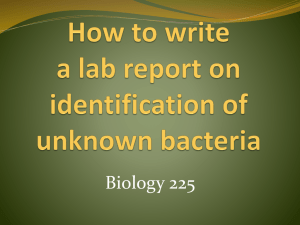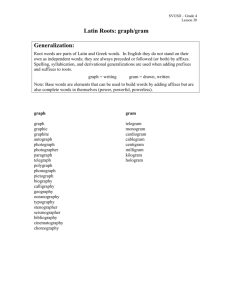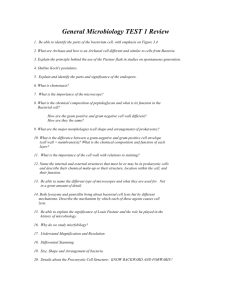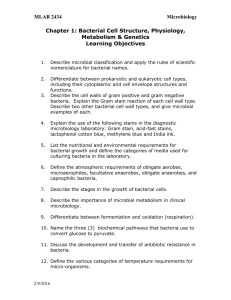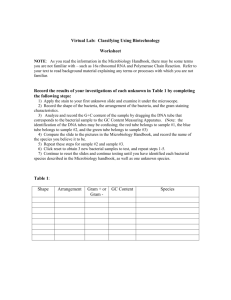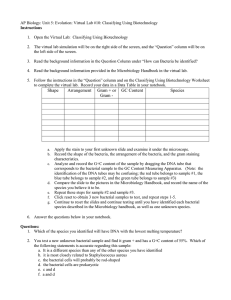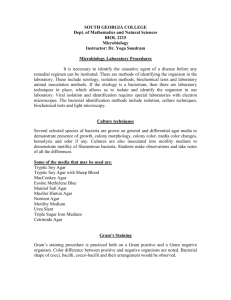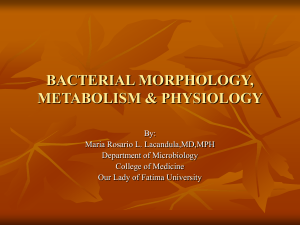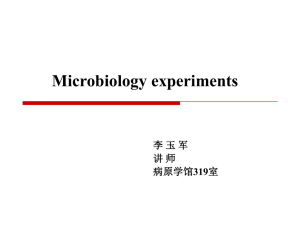Task_example1
advertisement
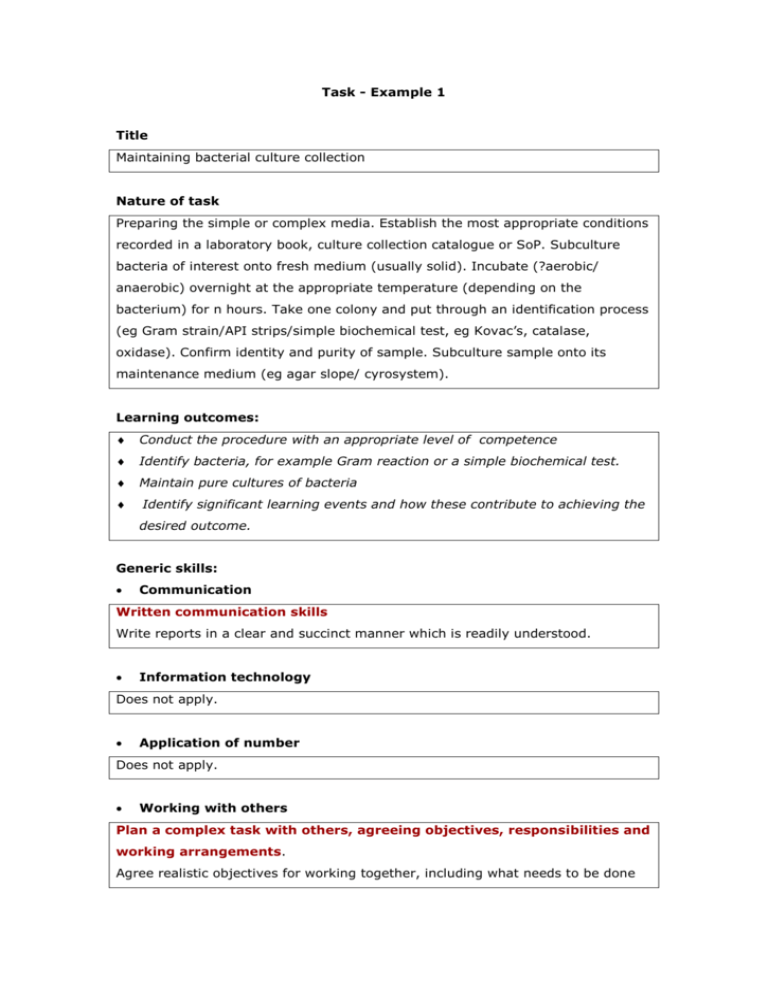
Task - Example 1 Title Maintaining bacterial culture collection Nature of task Preparing the simple or complex media. Establish the most appropriate conditions recorded in a laboratory book, culture collection catalogue or SoP. Subculture bacteria of interest onto fresh medium (usually solid). Incubate (?aerobic/ anaerobic) overnight at the appropriate temperature (depending on the bacterium) for n hours. Take one colony and put through an identification process (eg Gram strain/API strips/simple biochemical test, eg Kovac’s, catalase, oxidase). Confirm identity and purity of sample. Subculture sample onto its maintenance medium (eg agar slope/ cyrosystem). Learning outcomes: Conduct the procedure with an appropriate level of competence Identify bacteria, for example Gram reaction or a simple biochemical test. Maintain pure cultures of bacteria Identify significant learning events and how these contribute to achieving the desired outcome. Generic skills: Communication Written communication skills Write reports in a clear and succinct manner which is readily understood. Information technology Does not apply. Application of number Does not apply. Working with others Plan a complex task with others, agreeing objectives, responsibilities and working arrangements. Agree realistic objectives for working together, including what needs to be done to achieve them. Exchange information and agree responsibilities. Agree suitable working arrangements with others. Improving own learning and performance Agree task targets, plan meeting these targets and use support from appropriate people. Seek information on ways to achieve the task, and identify factors that might affect your plans. Use this information to agree realistic targets with appropriate people. Effectively manage your time and use of support to meet targets, including alternative action for overcoming possible difficulties. Review progress and establish evidence of achievements, including how you have used learning from other tasks to meet new demands. Provide evidence of the quality of your learning and performance, including factors that have affected the outcome. Exchange views with appropriate people to agree ways to further improve your performance. Problem solving Does not apply. Professionalism Ensure compliance with Safety guidelines Has a high awareness and is fully compliant with the Organisation’s Health & Safety recommendations. Adherence to Standard Operating Procedures (SOPs) Follows instructions and adheres to standard operating procedures. Preparation of materials Proficient at preparing solutions, dilutions, media or specimens. Specific skills Using incubation appropriately for bacterial culture. Gram staining. Microscopy. Aseptic technique. Assessment Evidence for the portfolio: Use of laboratory notebook, Gram staining reaction. Notes on any changes to the methods or contaminants. Purity checks. Microscopy skills. Table of results (see example). Additional help/information sought and at what stage. NB Keep examples of this evidence as it will need to be uploaded into the website from October 2003. Justification of level Development of Knowledge and Understanding (subject specific). Knowledge base Comprehensive/detailed knowledge of microscopy, aseptic techniques, bacterial cell and colony morphology, growth requirements. Cognitive/Intellectual skills (generic) Evaluation: Can critically evaluate Gram stains and biochemical test to support conclusions/recommendations, reviewing its reliability, validity and significance. Can investigate contradictory information/identify reasons for contradictions Key/transferable skills (generic) Learning resources: With minimum guidance can manage own learning using full range of resources including reference books, SOP’s, previous data and input of more experienced staff to complete the task. Self evaluation: Can seek and make use of feedback during the task and at the completion of the task. Autonomy: Can take responsibility for own work and can criticise it. Practical skills (subject specific) Application of skills: Can operate in complex and unpredictable contexts, requiring selection and application from a wide range of innovative or standard techniques Autonomy in skill use: Able to act autonomously, with minimal supervision or direction, within agreed guidelines. Reflection on the task Main activities Sub-culture bacterial cells from existing slopes or plates, incubate biochemical tests; catalase and oxidase tests, stain; Gram stains, spore stains cryo-preserve: freeze cells and cell supernatant down in –20 or –80 or liquid N2 resusitate cells. What I learned (this is what I now know) how to do a Gram stain how to freeze down cells that special freeze medium is required that resuscitating cells can be quite difficult how important good aseptic techniques are essential. the complexity of the task the activities need to be completed sequentially good record keeping is essential What I’m still wondering (what I still don’t know) Why some cells are kept in liquid N2 vapour phase and some are immersed in liquid N2 Action points (what am I going to do about it) Talk to the senior technician about cryo-preservation and why some cells are more viable if kept at –80 0C whilst others are more viable if stored in liquid N2 Talk to the senior technician about why we need to keep so many duplicates of the same samples cryopreserved. Sign-off Supervisor signs this off.
